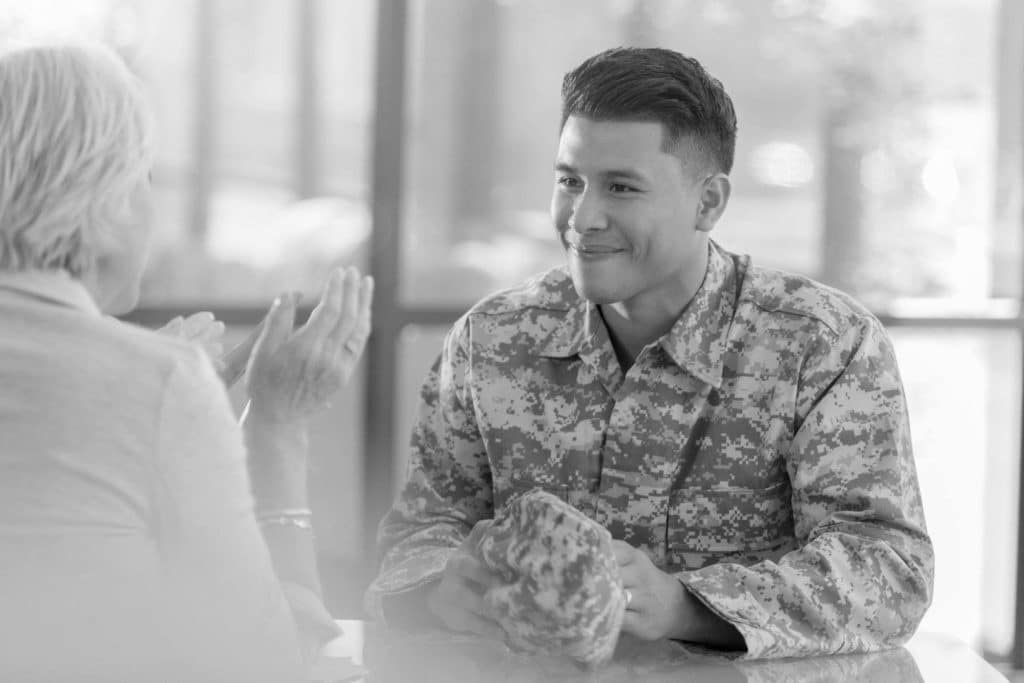Interview Tips For Hiring Military Veterans

Many members of the United States Armed Forces are returning home to a progressively competitive civilian job market. What’s worse is the fact that these men and women are having difficulty translating broad military experiences into gainful employment. If you’re interviewing veterans, you’ll want to understand how their service can be a major asset to your team.
Most military veterans who went straight from high school or college into the military have never applied for a job before, according to Brian Stann, former Marine Corps Captain and President of Hire Heroes USA. This means that effectively translating their skill-sets from military to civilian roles can be quite difficult for them.
Stann’s comments are directly on point. Civilian recruiters hiring military veterans have the added challenge of interpreting unfamiliar experience into valuable, career-based skills, whether they’re M1A1 Abrams Tank Operators or Platoon Leaders.
Before you interview veterans and service members, consider the following interview tips and discover a strong crop of top candidates.
Uncover Qualities Through Performance Based Interviews
Interviewing veterans is no different than interviewing a civilian candidate. The Department of Veterans Affairs (VA) even recommends using performance based interviews for applicants directly out of the service. This type of interview has been widely used for the past 30 years and focuses on what a person has done, instead of what they would do.
As many recruiters know, the performance based interview does have its flaws. Most notably is the fact that an applicant with great presentation skills can secure strong consideration by conveying what the interviewer wants to hear over what is true, meaning they may or may not possess the skills relevant to the position.
To avoid this, shift the focus from past behavior to verifiable experiences and achievements that matter most to the specific position. Basically, don’t look at achievements, but the path that led them there.
When interviewing and potentially hiring military veterans, this may require some tailoring of normal interview questions to fit the applicant.
How to Tailor Your Interview Questions to Veteran Experience
If you’re interested in the veteran applicant’s ability to handle customer service, you’ll want to ask them interview questions that allow them to provide a complete answer. For example:
Tell me about a situation where you realized a person needed help. How did you realize the person needed assistance and what did you do? What was the outcome of this situation?
Keeping in mind that this could be the first civilian job interview for a Veteran, asking them to provide a time they had to deal with an unruly customer may not yield an appropriate answer.
Also, remember that the rules of combat and military service often differ from civilian life. Your job is to determine if the candidate you’re interviewing can differentiate these situations.
What Not to Ask in the Interview Process
Beyond knowing what interview questions to ask, remember to keep the interview legal when hiring military veterans by avoiding interview questions related to the candidate’s type of discharge, current military status, and potential disabilities.
Asking questions related to training, education and service experience is fine. However, unless you’re a Federal agency or deal with Veteran Preference Points, you should never ask anything that requires the veteran to give their discharge status.
Similarly, you should avoid questions pertaining to an applicant’s military status. Asking a National Guardsman if they will be deployed soon is similar to asking a woman if she is pregnant or planning to have children.
Lastly, if you are interviewing a wounded warrior, refrain from asking questions that would require them to disclose any disabilities.
It’s perfectly fine, and encouraged, to ask an applicant if they have read the job description and can fulfill the minimum job requirements. However, questioning an applicant on their disability or trying to uncover PTSD or a traumatic brain injury is a direct violation of the Uniformed Services Employment and Reemployment Rights Act as well as the Americans with Disabilities Act.
The Benefits of Hiring Military Veterans
Hiring veterans isn’t charity work. These men and women possess job skills and qualities that don’t just make them good employees, but some of the best employees.
Countless military veterans with little or no career experience have thrived after being hired for civilian roles. In many cases, these employees prove to be major contributors to the company’s success; however, not every employee will be a seamless fit (as with any new hire), emphasizing the importance of acquiring stand-out candidates.
Regardless, military experience and its related qualities—leadership, respect, teamwork, loyalty, and the ability to produce results under pressure—can help any company reach new heights.
As you consider your next group of new hires, don’t discount our nation’s veterans. Dig deeper and ask questions that truly uncover values and qualities that can determine how well they mesh with your company’s culture.
Before Interviewing Veterans and Other Professionals, Find Top Candidates
Hiring military veterans is a great approach to bolstering your organization with well-disciplined, highly trained, and capable individuals. Still, their potential value to your company may not always be readily apparent if you’re not prepared. Before you conduct interviews, however, you’ll want to field the best and brightest. Monster’s job board is a great place to find top talent, and you can post your next job for free.